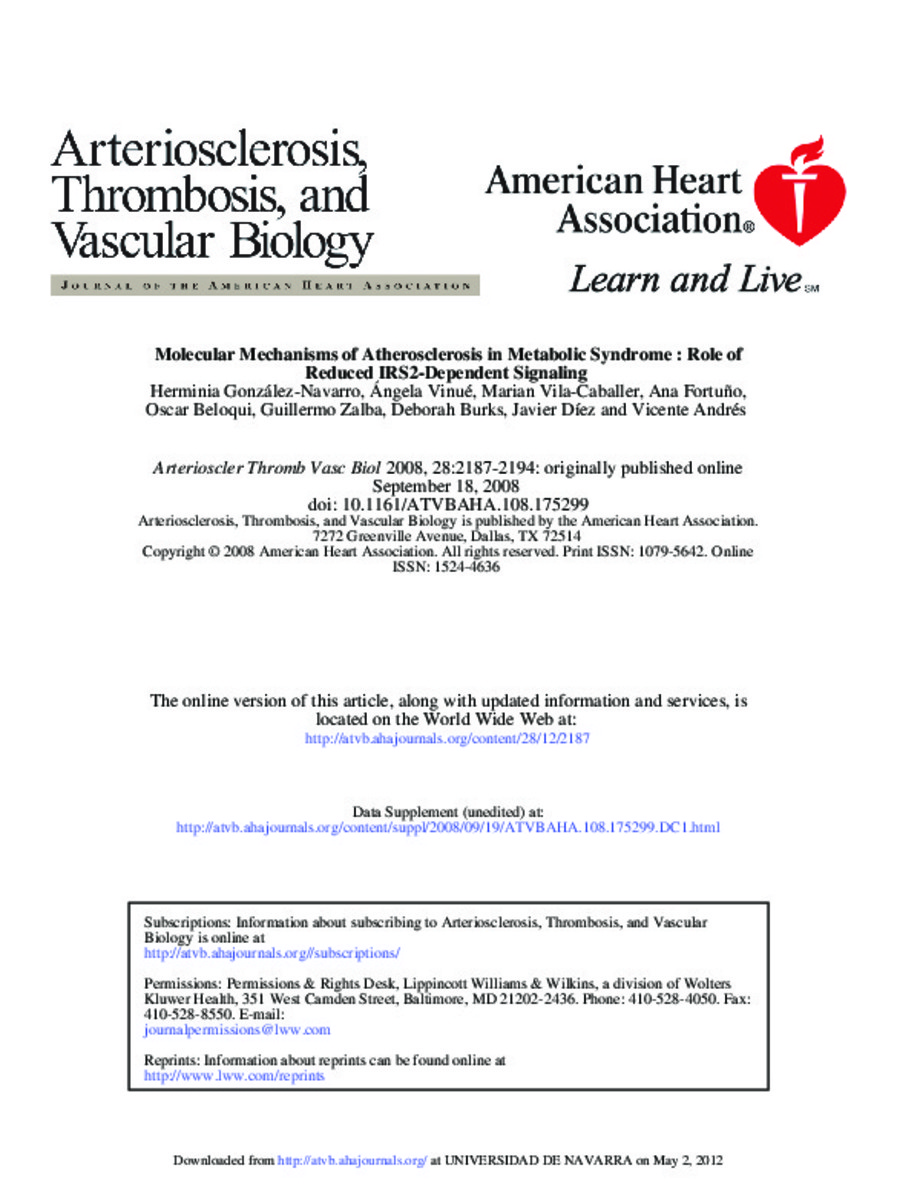Full metadata record
| DC Field | Value | Language |
|---|---|---|
| dc.creator | Gonzalez-Navarro, H. (Herminia) | - |
| dc.creator | Vinue, A. (Angela) | - |
| dc.creator | Vila-Caballer, M. (Marian) | - |
| dc.creator | Fortuño, A. (Ana) | - |
| dc.creator | Beloqui, O. (Óscar) | - |
| dc.creator | Zalba, G. (Guillermo) | - |
| dc.creator | Burks, D. (Deborah) | - |
| dc.creator | Diez-Martinez, J. (Javier) | - |
| dc.creator | Andres, V. (Vicente) | - |
| dc.date.accessioned | 2012-05-02T09:22:43Z | - |
| dc.date.available | 2012-05-02T09:22:43Z | - |
| dc.date.issued | 2008 | - |
| dc.identifier.citation | Gonzalez-Navarro H, Vinue A, Vila-Caballer M, Fortuno A, Beloqui O, Zalba G, et al. Molecular mechanisms of atherosclerosis in metabolic syndrome: role of reduced IRS2-dependent signaling. Arterioscler Thromb Vasc Biol 2008 Dec;28(12):2187-2194. | es_ES |
| dc.identifier.issn | 1524-4636 | - |
| dc.identifier.uri | https://hdl.handle.net/10171/21856 | - |
| dc.description.abstract | OBJECTIVE: The mechanisms underlying accelerated atherosclerosis in metabolic syndrome (MetS) patients remain poorly defined. In the mouse, complete disruption of insulin receptor substrate-2 (Irs2) causes insulin resistance, MetS-like manifestations, and accelerates atherosclerosis. Here, we performed human, mouse, and cell culture studies to gain insight into the contribution of defective Irs2 signaling to MetS-associated alterations. METHODS AND RESULTS: In circulating leukocytes from insulin-resistant MetS patients, Irs2 and Akt2 mRNA levels inversely correlate with plasma insulin levels and HOMA index and are reduced compared to insulin-sensitive MetS patients. Notably, a moderate reduction in Irs2 expression in fat-fed apolipoprotein E-null mice lacking one allele of Irs2 (apoE(-/-)Irs2(+/-)) accelerates atherosclerosis compared to apoE-null controls, without affecting plaque composition. Partial Irs2 inactivation also increases CD36 and SRA scavenger receptor expression and modified LDL uptake in macrophages, diminishes Akt2 and Ras expression in aorta, and enhances expression of the proatherogenic cytokine MCP1 in aorta and primary vascular smooth muscle cells (VSMCs) and macrophages. Inhibition of AKT or ERK1/2, a downstream target of RAS, upregulates Mcp1 in VSMCs. CONCLUSIONS: Enhanced levels of MCP1 resulting from reduced IRS2 expression and accompanying defects in AKT2 and Ras/ERK1/2 signaling pathways may contribute to accelerated atherosclerosis in MetS states. | es_ES |
| dc.language.iso | eng | es_ES |
| dc.publisher | Lippincott, Williams & Wilkins | es_ES |
| dc.rights | info:eu-repo/semantics/openAccess | es_ES |
| dc.subject | Insulin resistance/metabolic syndrome | es_ES |
| dc.subject | Atherosclerosis | es_ES |
| dc.subject | IRS2 | es_ES |
| dc.subject | AKT | es_ES |
| dc.subject | Extracellular signal-regulated kinase (ERK) | es_ES |
| dc.title | Molecular mechanisms of atherosclerosis in metabolic syndrome: role of reduced IRS2-dependent signaling | es_ES |
| dc.type | info:eu-repo/semantics/article | es_ES |
| dc.relation.publisherversion | http://atvb.ahajournals.org/content/28/12/2187 | es_ES |
| dc.type.driver | info:eu-repo/semantics/article | es_ES |
Files in This Item:
Statistics and impact
Items in Dadun are protected by copyright, with all rights reserved, unless otherwise indicated.






